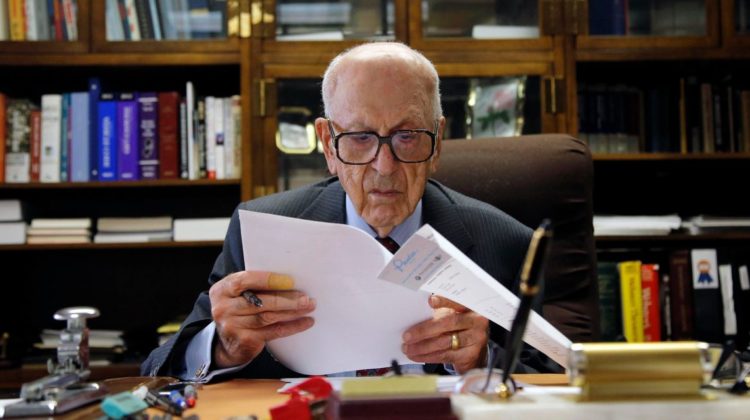
At 90,
Berkshire Hathaway
CEO Warren Buffett isn’t the oldest major corporate chieftain in the country. That title probably belongs to the 99-year-old George Joseph, chairman and controlling shareholder of
Mercury General
(ticker: MCY).
Joseph remains active at the California auto insurer, sharing the leadership reins with the CEO, Gabriel Tirador. Joseph might also be the world’s oldest billionaire, with a net worth estimated by Forbes at $1.6 billion. He founded Mercury in 1961—four years before Buffett took control at Berkshire—and the company is very much his baby, as it is with Buffett and Berkshire.
Mercury’s shares, now around $46, look appealing. Most notable is the company’s lofty dividend of $2.53 a share, which results in a 5.4% yield. The stock trades for 1.3 times book value and about 13 times projected 2021 earnings of $3.43 a share.
This year’s estimated profits of $4.68 a share are inflated by the reduced driving activity that has come as a result of the pandemic, leading to fewer accidents and better underwriting results. The company is the No. 6 auto insurer in the Golden State with an 8% share of the private-passenger market, according to AM Best.
Not surprisingly, Joseph is old-school: Mercury maintains a balance sheet with little debt and focuses on maintaining low operating costs and rooting out insurance fraud. The company has virtually no analyst coverage, stopped doing quarterly earnings conferences calls with its most recent results, and is run like a private company by Joseph.
He favors dividends over share buybacks. The company has raised its payout every year since it went public in 1985, although in recent years the increases have been tiny, just a penny a share every year.
“I think dividends are important,” Joseph told Barron’s in 2003. “The best indicator that you’re making real money and not manufacturing profit from accounting games is the ability to pay a dividend and increase it.” Joseph declined to speak for this article, as did Mercury’s management.
He owns 35% of the company, or 19.6 million shares, with about 800,000 shares purchased on the open market this year. His ex-wife, Gloria Joseph, who is 96, owns 16%.
“Mercury is a mispriced asset,” says Mike Absher, the founder and chief investment officer of Absher Wealth Management of Chapel Hill, N.C., which counts Mercury among its top holdings. “Our clients can get a 5% dividend while we wait.”
The wait is for the post-Joseph era, when Absher sees a good chance of a sale of the company, which has a digestible market value of $2.5 billion.
“If a company like
Allstate
[ALL] bought Mercury, it would be accretive on day one, even if a large premium is paid, because of how conservative the balance sheet is,” Absher says.
Auto insurers can generally generate premium income annually equal to about three times their capital. For Mercury, that ratio is closer to two, resulting in estimated surplus capital of about $500 million. Other potential acquirers include
Progressive
(PGR) and even Berkshire (BRK.B).
E=Estimate.
Source: Bloomberg
Mercury sells auto and homeowners insurance through independent agents. Mercury could appeal to Progressive, which sells insurance directly to drivers and through agents. Progressive could benefit from greater scale in California, where it ranks ninth, according to AM Best.
Mercury gets about 75% of its revenue from personal auto insurance, with most of the rest from homeowners insurance. About 86% of its sales are in California.
The company has scaled back its national expansion, recognizing that its “circle of competence stops at the California state line,” says Christopher Bloomstran, founder and chief investment officer at Semper Augustus Investments Group, a Mercury holder. “This is not the place to get rich as a shareholder, but it’s likely a place where you won’t get blown up,” he wrote to investors earlier this year.
Mercury’s record in the past 20 years has not been great, however. The stock has barely budged since 2003, and its operating earnings last year were no higher than they were that year. It earned its dividend in just two of the past five years.
Mercury’s auto insurance underwriting results have been near break-even in recent years, in line with the industry, but it has been hurt by California wildfires and other catastrophes in its homeowners insurance. Investment income, mostly from a municipal-bond portfolio, provides the bulk of its profits.
California is a tough state for auto insurers because of consumer-friendly regulation and an elected insurance commissioner. “California’s insurance commissioner has a longstanding record of penalizing insurance companies to the benefit of the public,” Raymond James analyst C. Greg Peters wrote in a recent note. He has an Underperform rating on the stock.
California limits what insurers can use in setting rates, including a ban on telematics, or the use of special devices or phone apps that monitor customer driving. This has been one of the hottest trends in auto insurance, led by Progressive. A recent initial public offering,
Root
(ROOT), bases its rates on telematics.
With improved earnings, Mercury’s 5.4% dividend yield looks secure, giving investors ample income as they await a potential sale of the company after the death of its founder.
Write to Andrew Bary at andrew.bary@barrons.com
